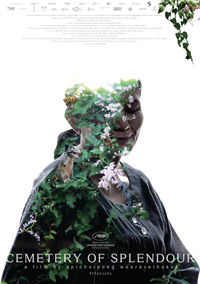Syndromes And A Cemetery: Thai Joe Returns With A Familiar Stunner

As always, Joe brings back his regular actors/characters from previous films and let’s them exist in both isolation to and in conversation with the ‘past lives’ of those films. Here, Jenjira (Jenjira Pongpas Widner) is a hospital volunteer with a lame leg who tends to Itt (Banlip Lomnoi, the soldier Tropical Malady (2004) who hunts for his lover deep in Thai forest), one of many soldiers suffering from a kind of narcolepsy that makes them spontaneously lose consciousness. Jenjira meets another volunteer, Keng (Jarinpattra Rueangram), the aforementioned medium, and the two will go on a blind and delirious hunt with Itt and his past incarnations’ lingering ghosts, which thematically serves as an excursion into Thailand’s disappearing origins in the face of the current dictatorship’s modernization projects.
It’s a pared down take on familiar themes, but it achieves a new level of sustained, serene hypnosis in Joe’s cinema. Scenes progress–or rather, float–one to the next, undetermined by logic, into and out of realities, hyperrealities, and surrealities. Hospital equipment is indistinguishable from Dan Flavin sculptures, silences become statements, and mundanity rendered tragic. A dream–that is, reality–is a nightmare by default, and living becomes an act of staring, studying, eyes wide open, the horrors of what has come, willing the mind to wake up and return to a former utopia. The feeling isn’t quite discernible until the film is over, but there’s a sense of heartbreak here that rivals the most devastating of Joe’s features–Tropical Malady, included.
Reviewed on May 18th at the 2015 Cannes Film Festival – Un Certain Regard – 123 mins.
★★★★/☆☆☆☆☆